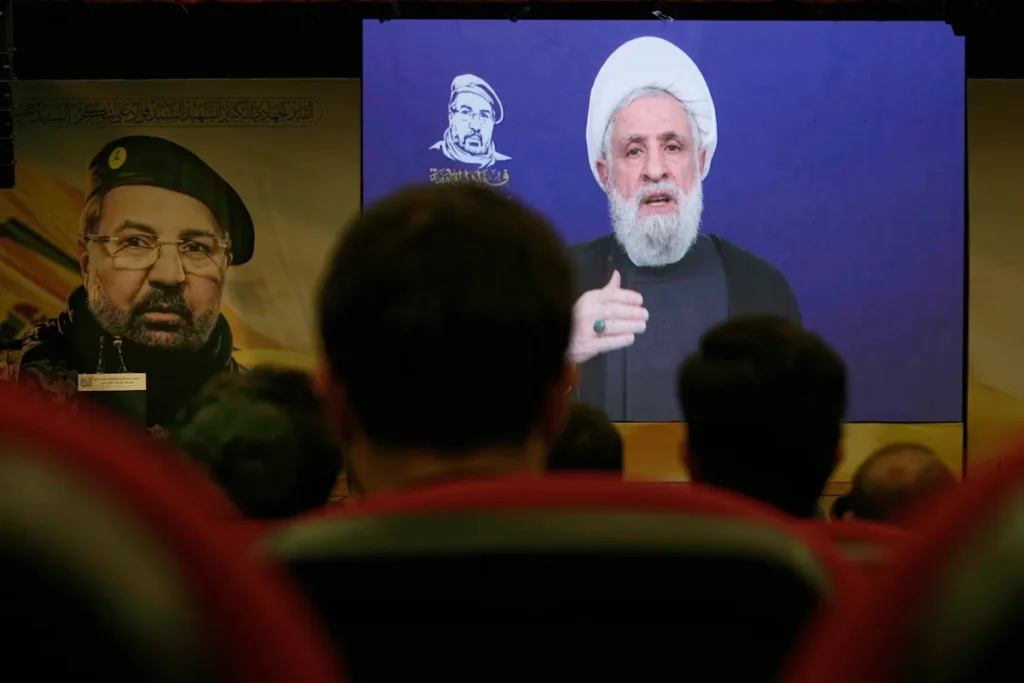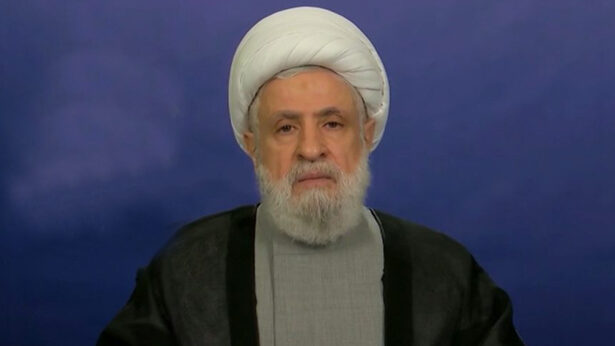Hezbollah’s second-in-command, Sheikh Naim Qassem, has sent seismic waves across the Middle East with an extraordinary and shocking public call for Saudi-Hezbollah unity. In a statement that has reverberated from Beirut to Riyadh and Washington, Qassem explicitly urged the Kingdom of Saudi Arabia to “open a new page” in relations and join forces with the Iran-backed group to collectively stand against what he termed “Israeli aggression.” This unprecedented outreach challenges decades of bitter geopolitical rivalry and introduces a profound new variable into the region’s security architecture.
The statement is more than just rhetorical posturing; it is a calculated political maneuver aimed at exploiting current regional tensions and reframing the complex, multi-layered conflict between Israel and its adversaries. For Riyadh, an alliance with Hezbollah—a group designated as a terrorist organization by the GCC—would represent a radical, almost unthinkable, pivot away from its long-standing security partnerships and its deeply ingrained animosity toward Iran’s proxy network. Yet, the very notion of this proposition demands a deep dive into the historical animosities, the changing geopolitical landscape, and the motives behind Hezbollah’s audacious plea for Saudi-Hezbollah unity.
The Decades of Division: Why is Saudi-Hezbollah Unity So Shocking?
To understand the enormity of Qassem’s proposal, one must first appreciate the depth of the rivalry between Saudi Arabia and Hezbollah. This is not simply a political disagreement; it is the core of the sectarian and geopolitical struggle that has defined the Middle East for the last two decades.
Since its founding, Hezbollah has been the quintessential expression of Iran’s foreign policy: a highly trained, heavily armed, non-state actor with deep roots in the Shi’ite community. Saudi Arabia, the regional Sunni powerhouse and historical rival of Iran, views Hezbollah as a direct threat to its national security and regional stability.
Key areas of historical conflict include:
- Yemen Civil War: Saudi Arabia leads a coalition fighting the Iran-aligned Houthi movement, a group whose model and support structure mirror aspects of Hezbollah’s.
- Syrian Civil War: Hezbollah was instrumental in propping up the Assad regime, directly countering Saudi Arabia’s support for opposition groups.
- Lebanese Politics: Riyadh has long accused Hezbollah of hijacking the Lebanese state, leading to a breakdown in diplomatic and financial relations, often freezing aid and investment to the struggling nation.
- Designation as Terrorists: The Gulf Cooperation Council (GCC), led by Saudi Arabia, formally designated Hezbollah as a terrorist organization years ago, prohibiting its citizens and financial institutions from dealing with the group.
Given this history of proxy wars, ideological warfare, and direct competition for regional influence, the call for Saudi-Hezbollah unity is a monumental shift. It suggests that, in the group’s view, a shared existential threat—namely, Israeli military and political actions—has now superseded decades of mutual antagonism.
Hezbollah’s Calculated Motive: Exploiting the Regional Climate
Sheikh Naim Qassem’s timing is impeccably strategic, capitalizing on a moment of significant flux in the Middle Eastern geopolitical climate. The core argument he presented—that “pressure on the group ‘only benefits Israel'”—is a potent one designed to appeal directly to the sensibilities of Arab publics and, critically, to the Saudi leadership’s perception of its own security interests.
1. The Shifting Focus of Arab Public Opinion
For years, the conflict with Iran’s proxies (including Hezbollah) was the primary regional security concern for Riyadh. However, sustained conflict and instability, particularly recent Israeli military campaigns, have put immense strain on the fragile consensus among Arab states. Hezbollah’s message essentially attempts to resurrect the pre-eminent role of the Arab-Israeli conflict in regional politics, hoping to leverage Arab solidarity against Israel as a means to legitimize and empower itself.
2. Undermining Saudi Normalization Efforts
The Kingdom has been publicly and privately engaged in discussions with the United States regarding a potential normalization deal with Israel, a move that would fundamentally alter the balance of power. By proposing a dramatic shift towards a united front against Israel, Hezbollah attempts to place political pressure on the Saudi government. If Riyadh were to ignore this call, it risks being perceived by hardline factions and elements of the Arab street as being too aligned with Israel’s interests, especially amid regional military flare-ups. This is a classic political tactic of forcing an opponent to choose publicly between a deeply held ideological principle (the Palestinian cause) and a strategic geopolitical goal (normalization).
3. Strategic Buffer from Pressure
Hezbollah is constantly under immense pressure, both militarily from Israel and economically/politically from the international community and domestic Lebanese rivals. The only entity that has the financial and diplomatic muscle to significantly ease this pressure, other than Iran, is Saudi Arabia. By offering a partnership, Hezbollah is essentially asking the Kingdom to provide it with a measure of regional legitimacy and a potential counter-balance to Israeli military actions, effectively making a strike on Hezbollah a strike against a broader, pan-Arab alignment.
Saudi Arabia’s Dilemma: A Choice Between Principles and Pragmatism

For Saudi Crown Prince Mohammed bin Salman (MbS), the call for Saudi-Hezbollah unity presents an incredibly complex and high-stakes choice. Every element of Saudi Arabia’s current foreign policy doctrine seems to reject the very idea.
1. The Normalization Track
The cornerstone of current Saudi strategy is Vision 2030, which demands regional stability and global economic integration. A normalization deal with Israel is seen as a key component of this, unlocking significant benefits, including a formal defense treaty with the U.S. and massive American investment. Aligning with Hezbollah—the de facto enemy of Israel—would immediately scuttle these normalization talks, risking the failure of a generational strategic pivot.
2. Security and Regional Stability
Hezbollah is an armed, non-state actor. A central pillar of Saudi foreign policy is supporting the concept of the nation-state and rejecting the chaos sown by non-state militias. A partnership would legitimize the entire model of Iranian proxy warfare that Riyadh has spent billions of dollars fighting in Yemen, Syria, and Iraq. It would signal a humiliating defeat in the ideological war against the Iranian “Axis of Resistance.”
3. Sectarian and Ideological Principles
The call asks the custodian of the Two Holy Mosques to ally with a Shi’ite militant group that explicitly follows the doctrine of Velayat-e Faqih (Guardianship of the Islamic Jurist), a system of governance that directly challenges the religious and political legitimacy of the Saudi monarchy. This ideological hurdle is perhaps the most difficult to clear.
However, the Saudi response will be governed by cold, hard pragmatism, particularly the shifting dynamic of the Red Sea and Gulf security.
Potential Pragmatic Considerations for Riyadh:
- De-escalation with Iran: Saudi Arabia and Iran have recently engaged in diplomatic de-escalation. A formal political distancing from Hezbollah would be seen as a sign of this de-escalation holding. A potential partnership, however, could be viewed as a drastic move to contain Israel and maintain a regional status quo without direct military confrontation.
- The ‘Arab First’ Identity: The Kingdom has been under pressure to demonstrate its commitment to the Palestinian cause. Rejecting the Hezbollah call out-of-hand may open the door for Qatar or others to seize the mantle of regional leadership on the issue. While an actual alliance is unlikely, a carefully worded response that expresses “Arab solidarity” while rejecting the “militia model” may be a political necessity.
- Economic Risk: Continued, low-level conflict in the region—especially one that risks spilling over into the Red Sea or Strait of Hormuz—is terrible for oil prices, investor confidence, and global supply chains. If Hezbollah convinces Riyadh that unity is the only way to compel Israeli restraint, the argument may gain traction among certain economic planners.
The Global Reaction: Washington, Tehran, and Tel Aviv
The immediate repercussions of Qassem’s statement were felt most acutely in the capitals of the region’s key external actors.
United States and Israel
The immediate and definitive reaction from both Washington and Tel Aviv has been one of staunch rejection. U.S. diplomats have reportedly characterized the call as a transparent attempt to “co-opt and mislead” regional actors and would view any Saudi move towards such an alliance as a hostile act. Israel views Hezbollah as its most potent non-state threat and any formal or even informal alignment with a major Arab state like Saudi Arabia would be interpreted as a severe strategic setback and a significant escalation of the conflict. Israel’s primary policy goal has been to isolate the Iranian “Axis of Resistance”—a Saudi-Hezbollah unity would be the very definition of the failure of that policy.
Iran
The reaction from Tehran is one of quiet satisfaction and strategic support. The Iranian regime has long dreamed of precisely this scenario: a unified front of major Arab powers and its proxy network, bound by a shared hostility toward Israel and an opposition to Western influence. If Saudi Arabia even entertained the idea, it would be a massive diplomatic victory for Iran’s regional foreign policy and its quest for hegemony. It would allow Tehran to indirectly influence Riyadh’s foreign policy decisions without direct intervention.
The Future of Regional Alignment: Beyond the Headlines
While an overt military and political alliance resulting in full Saudi-Hezbollah unity remains highly improbable, Qassem’s call achieves several key objectives simply by being uttered:
- It shifts the narrative: The regional conversation is forced to move away from the internal “Sunni vs. Shi’a” conflict and back to the “Arab vs. Israel” conflict.
- It tests Riyadh’s resolve: It forces the Saudi leadership to publicly reaffirm its foreign policy priorities, making the continuation of the normalization track politically more costly.
- It legitimizes Hezbollah: By placing Hezbollah on the same diplomatic plane as a major regional power, the group is elevated beyond its status as a mere militia in the eyes of many regional observers.
The truth of the matter is that the relationship between Riyadh and the “Axis of Resistance” will likely evolve into a complex, transactional non-aggression agreement rather than a true alliance. Saudi Arabia is already engaged in direct talks with Iran and has reached a state of relative calm with the Houthis. A formal, quiet agreement to cease hostile rhetoric and avoid military confrontation with Hezbollah (and other proxies) in exchange for reduced risk to Saudi borders and oil infrastructure is a far more plausible scenario than any true Saudi-Hezbollah unity.
The shocking call serves as a crucial inflection point, revealing a region where the old political fault lines are softening, and new, unpredictable alliances are being tested by the relentless pressure of escalating conflicts. As Riyadh carefully calculates its response, the world watches to see if decades of animosity can be set aside for a new, precarious geopolitical arrangement.
Do Follow Gulf Magazine on Instagram
Also read: Desserts of the UAE: A Blend of Culture and Tradition



